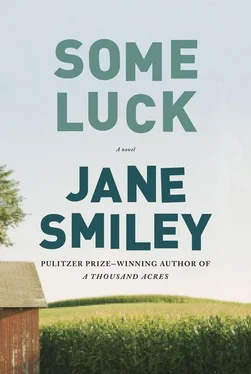It was Lois who said, one day when Joe was cultivating that field and went to the house to fill his water bottle and soak his bandanna again before laying it over the top of his head under his hat, “So — tell me one thing. Why is everyone falling all over themselves about your brother Frank?”
“Well, he served in some pretty big battles.”
“Yeah, but that’s not the reason. They say it’s the reason. But then they say, ‘Oh, Frank. I always knew he would get ahead.’ ”
“Minnie says that.”
“And everything else — he looks like Henry Fonda, he’s so tall and strong. He used to be blond, but this is nicer, really.” She was good at mimicking Minnie’s delivery. “Me, I don’t see it. He looks kind of scary to me. I like you better. You’re nice.”
“Well, you know me.”
“Well,” she insisted, “you are nice. You are nice to us every single day, and I for one know it.”
“Well, maybe I can’t help myself,” said Joe.
“You sound like it’s a fault.”
That night, lying in bed, Joe wondered if he thought being nice to Minnie and Lois was a fault. Across the room, his collie, Nat, was spread out all over the bed Joe had made him out of an old quilt, and the cats were sleeping in the front room, where they always did — Pepper in the chair by the window and Booster on the heat register. Out in the old barn, he still had two milkers, Betty and Boop, the last in the neighborhood. When they calved, he sold the calves as vealers, but he named them and let them live with Betty and Boop until they were a few months old. This year’s pair he had named Harry and Bill, even though Bill was a heifer. He had four rabbits in a hutch — Eenie, Meenie, Miney, and Moe — and no earthly use for them. Rosanna said, “Do you name the houseflies, too?” and Walter always shook his head at the impending doom of naming animals you yourself were going to kill. Rosanna felt that letting the cats in the house was especially horrifying, and she didn’t know that Joe let them walk all over the kitchen table and the kitchen counter — was he as bad as Rolf yet? What had Rolf done in this house that had demonstrated his propensity for decline?
After Frank left, Minnie told Joe that she had to get busy now; her mother had died, and maybe she and Lois had better move to Cedar Falls, so that she could at last get her teacher’s degree and do something with her life. Lois was in her sophomore year — she could spend the last two years at a school where no one knew a thing about them or their father or their mother, and that would be good for both of them. Best to make up their minds that they were on their own now. Roland Frederick, Joe knew, wasn’t violent, but he was unpredictable. He had gone off, no one knew where, but he could always reappear.
All of this sounded fine, and he was so nice, so damnably nice, that he said, “You should do it, Minnie, you should. I think it’s the best idea.” What was it, sixty or seventy miles to Cedar Falls? Not a distance that he would comfortably travel, with Betty and Boop and Pepper and Booster and Eenie, Meenie, Miney, and Moe waiting for him at home.
IN THE END, Arthur found Frank a job for the government, not in Washington, but in Ohio, near Dayton. What Frank discovered on the job was that he was not alone in wondering what made the German army so good. His job was to go through papers — thousands and thousands and tons and tons of papers that had been uncovered, discovered, recovered by the Allies all over Germany in the last two years of the war. He even had a surprise — a squad from his own Seventh Army had set out from Berchtesgaden, probably on the very same day when Ruben was turning up his button and his spoon, and gone to a cave not far away, the very cave where Himmler had stored all his papers and then dynamited the entrance closed just before the end of the war. The most remarked-upon papers from that cave were the ones about death-by-freezing experiments: If you submerged a man in freezing water, how long would it take for him to get past reviving? The answer was, anywhere from about an hour to just under two hours. And every measurement was taken by the observing scientists as the subjects died — temperature, blood count, urine samples, pulse. Other subjects were successfully revived, by immersion into hot water, Frank gathered.
But the documents he enjoyed reading were not about making cheese in ninety minutes or the effects of “ionized air” or how to make rayon warmer by crimping the threads. He was mildly interested in something called Periston, which appeared to be fake blood, and the fact that a German U-boat was so well insulated and refrigerated that it could travel for months without surfacing to take on drinking water. What interested him the most was an infrared gun sight that had a range of three kilometers, in the dark. Frank felt immediately that he had been viewed by such a sight — maybe many times — that he had appeared as a fluorescent image on a tiny screen. It turned out that the marines in the Pacific had employed the thing once it was confiscated from the Germans, but Frank had never heard of it until now.
Because of the war, Frank’s speaking German was pretty good, but he had to work hard at reading the papers. For a while, his main job was just to sort them and box them — he at least knew when one set of papers ended and another set began. Even though others had translated enough to be taken aback, maybe amazed at what they found, there were vast quantities still to go through. American companies of all kinds were waiting for the results; the promise was that everything found would be published and go straight into the public domain. Each afternoon, when Frank left the giant building, formerly an airplane hangar, he saw rows of men who had read the weekly bibliography of patents and procedures, standing in line to buy the documents or to order the ones that hadn’t been printed yet.
Otherwise, Dayton was not that different from Usherton, and Frank was restless there. As a result, he went back and forth to Washington (in his new car, a Studebaker Champion) about once a month — he could get there in six or seven hours if he drove at night. Arthur and Lillian amused him, Arthur because he was genuinely amusing and Lillian because she was so obviously enjoying both Arthur and Timmy. Timmy, said Rosanna and even Walter (who had come in September), looked exactly like Frank himself. Sometimes, Frank squatted down in front of the playpen, watched Timmy, and tried to make something out about him — what he remembered most clearly from his own childhood was that lattice of ropes underneath Walter and Rosanna’s bed, that feeling of dim enclosure that was not unlike the safety of a foxhole, and was a relief from the space everywhere on the farm — yes, outside, but also out the windows and through the doors. He could lie under the bed, staring at the woven ropes and the ticking of the mattress and relax. For some reason, he had not been allowed to do it very often — he couldn’t remember why. The rest of his childhood was don’t touch that and get down from there and watch out for the back end of that cow and don’t let Jake step on your foot and be careful of the ladder and there’s a trapdoor there and stay back from the planter and don’t go near that by yourself and if you get caught in a thunderstorm, lie flat in a ditch and, yes, in a high wind, the outhouse could fall over, and careful of the thorns on the Osage-orange hedge. Only under the bed had he taken deep, quiet breaths and felt safe. He held out his forefingers to Timmy, and Timmy grabbed them and pulled himself upward, and then, when he was sitting, and balancing himself against Frank’s fingers, he started crowing and laughing.
Читать дальше












